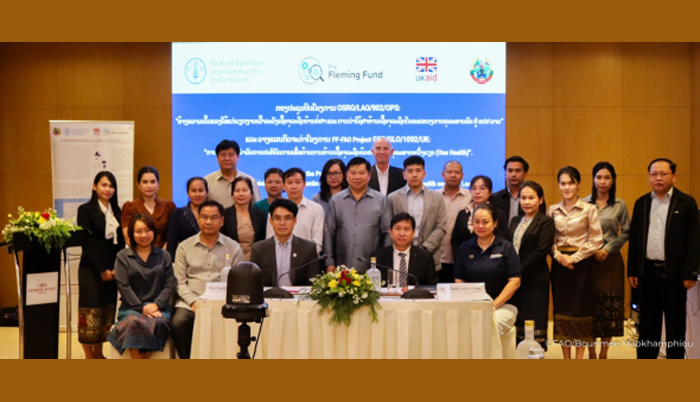![]() Home > Laos
Home > Laos
FAO Continues To Assist Laos’ Government In Controlling Antimicrobial Resistance In Humans, Animals

![]() July 1st, 2023 | 11:11 AM |
July 1st, 2023 | 11:11 AM | ![]() 439 views
439 views
VIENTIANE
(KPL) The Food and Agriculture Organization (FAO) of the United Nations concluded its four-year work on strengthening antimicrobial resistance (AMR) and antimicrobial use (AMU) surveillance in the animal health sector in the Lao PDR on June 30.
Subsequently, FAO announced to move into the second phase of implementation, to continuously support the work of the Department of Livestock and Fisheries (DLF) of the Ministry of Agriculture and Forestry (MAF).
The support was made possible with the generous contribution from the United Kingdom Agency for International Development (UK Aid).
AMR occurs when bacteria, viruses, fungi and parasites change over time and no longer respond to medicines, making infections harder to treat and increasing the risk of disease spread, severe illness and death.
The main drivers of antimicrobial resistance include the misuse and overuse of antimicrobials; lack of access to clean water, sanitation and hygiene for both humans and animals and the lack of awareness and knowledge. That is why AMR is a threat to human health but it also negatively affects the animal, plant, food and environmental sectors.
During the workshop, Mr Souphavanh Keovilay, Deputy Director General of the Department of Livestock and Fisheries, noted that the threat of AMR is still unknown to many, in particular to staff in the different sectors on the misuse and overuse of antimicrobials.
He thanked for the continuous technical expertise and knowhow provided by FAO through its Emergency Centre for Transboundary Animal Diseases (ECTAD) to strengthen the capacity of laboratory staff on detecting AMR in the livestock sector.
He also added that the AMR hazard can be significant reduced with increasing the level of awareness on the issue of all stakeholders, on which FAO and MAF are working closely together.
Throughout the course of four-year implementation through the fund provided through the UK Aid, FAO worked closely with DLF and other key agencies to produce a wide range of outputs. They hosted two national symposia on AMR and AMU for knowledge exchange under the One Health approach.
The National Antimicrobial Resistance Control Committee (NASCC) was established to oversee and provide guidance on the implementation of the activities related to combating AMR and reducing AMU.
The capacity needs of the National Animal Health Laboratory (NAHL) were assessed and relevant trainings to build capacity were subsequently provided. Support was given to NAHL to maintain an up-to-date AMR database. Epidemiology analysis of the AMR data was conducted and reported to policy makers, among other outputs.
“Antimicrobial resistance is a major global threat. It is an increasing concern to human and animal health. It also does have implications for both food safety and food security and the economic wellbeing of millions of farming households,” said Mr. Chanthalath Pongmala, Assistant (Programme) to the FAO Representative to the Lao PDR.
“FAO is grateful for the support and commitment extended from the United Kingdom Agency for International Development since 2017 to enable us to do more for the Government of the Lao PDR and its people. Through the Emergency Centre for Transboundary Animal Diseases (ECTAD), FAO successfully strengthened the collaborative One Health approach to address food safety, control of zoonotic diseases and AMR, by bringing all relevant stakeholders together to share information and ideas, while strengthening capacity of various government agencies involved in the AMR and AMU surveillance”, he added.
Source:
courtesy of KPL NEWS AGENCY
by KPL Lao News Agency
If you have any stories or news that you would like to share with the global online community, please feel free to share it with us by contacting us directly at [email protected]